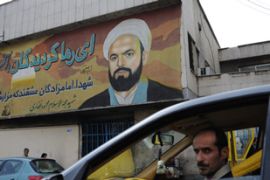Conservatives set for Iran gains
Reformists contesting just half of parliament’s seats after many were disqualified.

The polls open at 0430 GMT and are to remain open till 1930 GMT.
Turnout encouraged
Senior officials and state media have made every effort to encourage a massive turnout as a display of national unity.
| Your Views |
|
How will the outcome of Iran’s parliamentary elections affect its relations with the world? |
State television has been repeatedly playing patriotic music and pictures of long queues of people voting in past elections, as well as running interviews with ordinary and famous Iranians emphasising the importance of voting.
“Iranians will take part in the elections more gloriously than the past and will thwart plots of bullying powers to undermine the Islamic system,” Ayatollah Ali Khamenei,Iran’s supreme leader, said in a speech.
However, Saeed Mohammad Marandi from the University of Tehran told Al Jazeera that the voter turnout would be low despite the extensive advertising.
“And it is very difficult to know all the candidates at the same time.”
Voting turnout is expected to be around 50 to 60 per cent, which is similar to that of the 2004 elections.
Economic woes
The elections are being considered as a ‘litmus test’ for Ahmadinejad, who has been accused of failing to control inflation and increasing tensions over Iran’s nuclear ambitions, ahead of presidential elections in 2009.
| Related links |
Inflation in Iran has increased by 20 per cent and almost one in 10 people remain unemployed.
The Iranian parliament wields a good deal of power but its capacities are limited by the unelected Guardians Council, which must approve all of the parliament’s legislation.